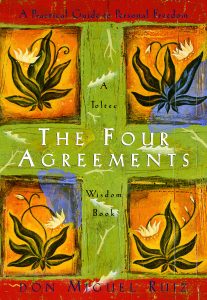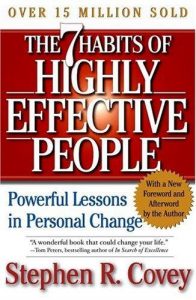
It’s early in the year, so there’s still time to focus on how you want to grow and develop during 2016. Here’s a list of personal development books I’ve compiled through the years that I think are meaningful, profound, thought-provoking and helpful. It’s an eclectic list. How many of them have you read?
7 Personal Development Books
1. Happiness Is a Serious Problem: A Human Nature Repair Manual (Dennis Prager)
According to the author, we have a moral obligation to be happy. Happiness includes a sense of spirituality and gratefulness. One of my favorite quotes from the author is, “Because gratitude is the key to happiness, anything that undermines gratitude must undermine happiness. And nothing undermines gratitude as much as expectations. There is an inverse relationship between expectations and gratitude: The more expectations you have, the less gratitude you will have.”
2. The Four Agreements: A Practical Guide to Personal Freedom (Don Miguel Ruiz)

Don Miguel Ruiz grew up in Mexico. His parents were healers and practitioners of ancient Toltec traditions. In his book “The Four Agreements,” which sold more than five million copies in the United States, he identifies four key mantras, which are essential for personal development:
Be impeccable with your word.
Don’t take anything personally.
Don’t make assumptions.
Always do your best.
3. Think and Grow Rich (Napoleon Hill)
Believe it or not, this book was written in 1937, but the principles described are still applicable today. A personal development and self-improvement book, the book lists 13 steps that are intended to help people to achieve the success they seek. Those steps are:
1) Desire
2) Faith
3) Autosuggestion
4) Specialized Knowledge
5) Imagination
6) Organized Planning
7) Decision
8) Persistence
9) Power of the Master Mind
10) The Mystery of Sex Transmutation
11) The Subconscious Mind
12) The Brain
13) The Sixth Sense.
4. As You Think (originally written by James Allen in 1908; revised by Marc Allen)
The author’s premise is that the keys to success come from our own minds. It is a self-help, self-empowerment book based on the belief that “we are masters of our own destiny.”
5. Spark: The Revolutionary New Science of Exercise and the Brain (John J. Ratey, M.D.)
Written in 2008, the author’s theory is that exercise improves physical, mental and psychological health. According to Dr. Ratey, regular exercise helps people “be more social, calm down, fight depression, improve focus, fight unhealthy additions, make better decisions, and have healthier babies.”
6. The 7 Habits of Highly Effective People: Powerful Lessons in Personal Change (Stephen R. Covey)

This book was first published in 1989 and was the first in a series with similar titles. It is a business and self-help book that teaches readers how to achieve their goals. The seven habits that Covey describes are divided into three sections: independence, interdependence, and continuous improvements. Under independence, the first three habits are: be proactive, begin with the end in mind, put first things first. The next three habits are: think win-win; seek first to understand and then to be understood; synergize. The last habit is sharpen the saw which relates to what Covey calls, “Balance and renew your resources, energy, and health to create a sustainable, long-term, effective lifestyle.”
7. Drive: The Surprising Truth About What Motivates Us (Daniel H. Pink)
According to the author, “the secret to high performance and satisfaction—at work, at school, and at home—is the deeply human need to direct our own lives, to learn and create new things, and to do better by ourselves and our world.” In his book he explains to readers about the “disconnect” between what science knows and what business does—and how that affects every aspect of life.
Read 15 Minutes Daily

Of course there are many more books worthy of mentioning, but what’s important is how much time, energy and commitment we all have toward our own personal development. The late, renowned sales-training expert Roy Chitwood used to remind salespeople that sign of a true professional is that they keep learning. To accomplish that goal, he suggested reading for 15 minutes every day, which would result in completing 18 books during a year. In Roy’s memory, I wish you happy reading and continual learning.

